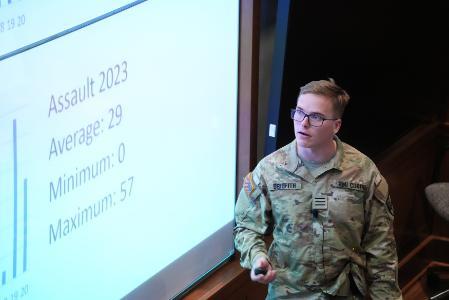Griffith Studies Crimes in Richmond Neighborhoods

Noland Griffith ’24 discusses crime in Richmond during Honors Week.—VMI Photo by Kelly Nye.
LEXINGTON, Va. April 3, 2024 — Do certain characteristics of a neighborhood affect crime? If so, what are those characteristics? That is what Noland Griffith ’24, a Virginia Military Institute cadet majoring in economics and business, sought to find out in his honors thesis, “An Exploratory Analysis of Crime From Randomly Selected Neighborhoods in Richmond, Virginia.”
According to Griffith, there are different aspects of crime that affect life in neighborhoods in big cities.
“In the 1970s, Chicago saw a huge increase in crime, which had a multitude of different effects on local neighborhoods. There was an inverse relationship between the price of homes and crime. Neighborhoods with more crime saw a decrease in the cost of houses. Those who moved out of the high crime areas had higher education and higher income. In addition, those who experience fear of crime are associated with increased depression and lower physical activity,” said Griffith.
For his study, Griffith randomly selected 20 neighborhoods scattered throughout the City of Richmond, Virginia, chosen from the Richmond Police Department (RPD) website. The RPD has recorded all criminal reports by date and by street since 2000. Griffith chose to focus his study to the crime of assault in the year 2023. He looked at nine independent variables in the selected neighborhoods in 2023: single-family homes, multi-family homes, apartments, businesses, public pools, parks, school, and churches, then systematically collected data from the Richmond GeoHub website.
Of all the independent variables he examined, he was most surprised with the results of having schools and churches present in a neighborhood.
“For each church present in the neighborhood, there was a correlation of 37.2 crimes, which is quite an odd thing to happen. When you think about churches, they usually have more civility, do charity work, and church people are usually nicer,” shared Griffith.
He found a few studies that agreed with his findings. One study found that by offering shelter or food, churches may attract individuals who commit crime. Another study indicated that because churches are only opened one day of the week, criminals are more inclined to visit the district. Griffith was quick to point out that churches do not cause crime, they are just correlated with crime.
“I'm not saying that you shouldn't put churches in areas. I think churches are beautiful structures. I'm religious. That's why I found this so interesting,” he said. The presence of schools also correlated with higher crime rates.
Griffith concluded his presentation by stating that more research should be conducted because of the underreporting of certain crimes, which may have caused his total crime numbers to be inaccurate.
According to Col. Sam Allen, professor in the Department of Economics and Business (ECBU), and Griffith’s advisor on the project, Griffith applied the statistical tools he learned studying ECBU.
“Noland’s curiosity about crime led him to look for patterns in the observable data, and to look for links to neighborhood characteristics. The experience has helped him develop his economic intuition, and illustrated the challenges and limitations of empirical analyses,” said Allen.
Griffith, who is minoring in applied mathematics, is the son of Katherine and Jonathan Griffith of Charleston, South Carolina, where he attended Bishop England High School. After graduation, he will commission into the U.S. Army.
Marianne Hause
Communications & Marketing
VIRGINIA MILITARY INSTITUTE
.svg)
.png)